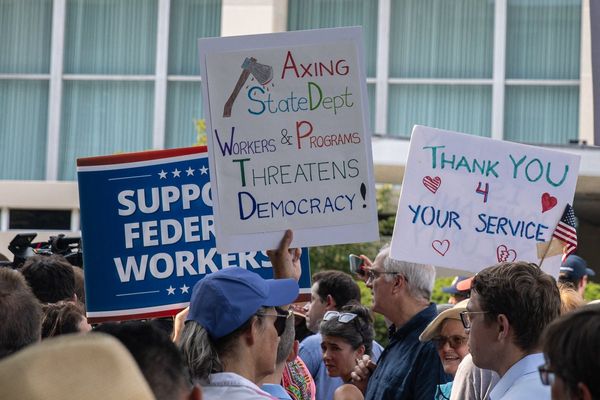
Khartoum (AFP) - Air strikes and gunfire rocked Sudan's capital on Friday as fighting showed no sign of abating, despite the threat of renewed US sanctions and mounting deaths, including dozens of children.
Hundreds have died in nearly three weeks of fighting between forces of Sudan's de facto leader Abdel Fattah al-Burhan, who leads the regular army, and his deputy turned rival Mohamed Hamdan Daglo, who commands the paramilitary Rapid Support Forces (RSF).
Battles persisted a day after US President Joe Biden threatened sanctions against those responsible for "threatening the peace, security, and stability of Sudan" and "undermining Sudan's democratic transition".
The north African country had already suffered under decades of sanctions during the rule of autocrat Omar al-Bashir, ousted in a palace coup in 2019 following mass protests on the streets.
"The violence taking place in Sudan is a tragedy -- and it is a betrayal of the Sudanese people's clear demand for civilian government and a transition to democracy.It must end," Biden said.
Witnesses reported continued air strikes and explosions in various parts of Khartoum on Friday, including near the airport.
The RSF has yet to respond following the announcement Wednesday of a seven-day truce brokered by neighbouring South Sudan and accepted by the army.
But early Friday, the paramilitary group said it was extending by only three days a previous truce brokered under US-Saudi mediation.
Children at risk
The conflict has killed about 700 people so far, most of them in Khartoum and the western Darfur region, according to the Armed Conflict Location and Event Data Project.
The UN children's agency, UNICEF, warned Friday that "the situation in Sudan has become fatal for a frighteningly large number of children".
Spokesman James Elder said the agency had received reports from a trusted partner -- not yet independently verified by the United Nations -- that 190 children were killed and 1,700 wounded during the first 11 days of the conflict.
He said the figures had been gathered from health facilities in Khartoum and Darfur since fighting broke out on April 15, meaning they only cover children who actually made it to facilities in those areas.
"The reality is likely to be much worse," Elder warned.
Aid workers have struggled to get much-needed supplies to the areas hit by violence.
According to the International Medical Corps, at least 18 aid workers have been killed amid the fierce urban fighting.
The UN Human Rights Council said it would hold a special session next Thursday "to address the human rights impact of the ongoing conflict".
Multiple truces have been agreed throughout the fighting, but none has been respected.
US Director of National Intelligence Avril Haines said Thursday that Washington expected the conflict to continue for a long time.
The fighting was "likely to be protracted as both sides believe that they can win militarily, and have few incentives to come to the negotiating table", she told a Senate hearing.
"Both sides are seeking external sources of support, which, if successful, is likely to intensify the conflict and create a greater potential for spillover challenges in the region."
Nearly 450,000 civilians have already fled their homes since the fighting began, the International Organization for Migration said, including more than 115,000 who have sought refuge in neighbouring countries.
International mediation
The UN refugee agency, UNHCR, said it was preparing for an outflow of 860,000 people, adding that $445 million would be needed to support them just through October.
Haines, the top US intelligence official, said the conflict had exacerbated already dire humanitarian conditions, "raising the spectre of massive refugee flows and aid needs in the region".
The United Nations warned that if the fighting continued, it could raise the already large number of Sudanese threatened by hunger and malnutrition by as many as 2.5 million.
"That raises the number to a total of 19 million people in the next three to six months," said Farhan Haq, a spokesman for UN chief Antonio Guterres.
Mediation efforts have multiplied since the conflict began.
Speaking in the Ethiopian capital Addis Ababa, an envoy of Burhan, Dafaallah al-Haj, vowed that "shortly the government of Sudan is going to put an end to this rebellion", referring to the RSF.
The RSF is descended from the Janjaweed, a militia unleashed by Bashir in Darfur, leading to war crimes charges against the former strongman and others.
After a joint coup in October 2021 that upended a fragile transition to civilian rule, Burhan and Daglo have engaged in a power struggle -- most recently over the RSF's integration into the regular army -- which has now flared into bloody violence.







